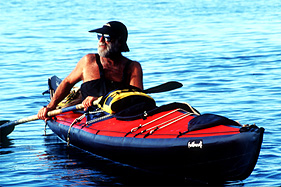
By Richard Roshon, Lecturer, Author, Kayak Entrepreneur Established 1975
A COLLECTION OF ARTICLES
The Sea – Lessons from Nature Living in the Moment From the Eyes of a Kayak “Omnipresence” = being present everywhere at the same time or living in the moment such as nature.
Our world’s oceans are 800 times as dense as the air of our atmosphere. The Sea distinguished as the World’s largest echo chamber where sound travels five times the distance than it does in our atmosphere. Marine mammals are 20 times as sensitive to sound as we ourselves, “If you listen you will see”.
The whale with a heart the size of a small compact car, the aorta a human being could crawl through, produces a heartbeat between 10 and 30 beats per minute (depending on the species) they circulate massive amounts of oxygen
As a freelance lecturer, writer and author, should my mind become blank while writing an article, I usually back off, and begin to breathe. A short time later my thoughts once again return. If someone were to cut in front of you on the highway, life is too short to get frustrated, besides your only frustrating yourself, not the person who cut in front of you. Sit back and breathe, and be thankful that you have a vehicle to get you to your destination. It works. How can we experience meditative moments?
Adding to this moment - during the winter months North Pacific Humpback whales migrate to the Hawaiian Archipelago to mate and give birth. The mating song sung by the male is within our hearing frequency as it travels through the world’s largest echo chamber. The SEA. It is the most relaxed feeling that nature can offer and it’s free. The song of the North Pacific Humpback whale filters through one’s body. I believe the next best thing would be Heaven. You are one within yourself. There are many lessons we can learn from nature, if we would only take the time to listen we would see. I feel Nature heals and can do more than medicine or medication if you give Nature those quiet moments and listen.
“Many Songs Lifting Spirits – People ae happier when they spend time with a diversity of bird species”. In recent years, scientists have gathered extensive evidence that spending time in nature positively affects people’s emotional and physical health. Also people are less likely to suffer from depression, anxiety and stress compared to people who live in areas with fewer birds and plants. Human brains might be genetically attuned to enjoying nature.” Nature heals the body, mind and soul. In the late 1970’s I decided to spend my first night at sea in my sea kayak. As the sun set a North Pacific Humpback whale surfaces along side with her new born calf. The calf is having trouble breathing, lying upon its mother’s back for support. The calf is expelling blood from his blow hole. After a period of time mother with calf swim away.
I look up to see two pectoral fins protruding up on both sides of my kayak, while she gently rubs her body on the underside of my kayak. It is the mother from the previous evening, and no calf. Our encounter from the previous evening (perhaps) held some meaning. Over the past several decades and nearly every year and within the same month and the same area we come in contact with each other, she will bring her new born calves along side, and before departing will normally surface from beneath as I slowly slide from her side. I reach out to touch the two layers of skin that cover the blubber - it wrinkles. Here in Hawaii we call this chicken-skin, also known as the goose bumps. The whale, so sensitive to touch. A true indication of the fragility of all natural life, both land and sea. We make eye contact as I see my reflection in her eye. I’m humbled. Many times I have seen a mother roll over, with pectoral fins held high, her calf swims upon her belly – she crosses her pectoral fins as if to caress her calf.
A LESSON FROM NATURE. - The sense of touch. 2020 the Covid 19 virus: Touching is a bonding – security in which all species participate. However that bonding (for the time being) has separated us as a human species. The solid hand shake, the hug, gone, as we distant ourselves from from that all important sense of TOUCH. Wearing the mandatory mask, we are absent of seeing a smile.
To have a 40-ton North Pacific Humpback whale lie beneath my kayak in its weightless environment can only be described through feelings. I am not a marine biologist; I do not need to dissect why nature does what it does. I live a simple life and have learned to enjoy the moment of living by lessons observed from nature.
What are whales thinking? Once asked by a young lady during a
(Throughout the night I drift under the light of a Full Moon in my sea kayak between the islands of Maui, Lanai and Molokai in my Eskimo Expedition Kayak. The sounds of whales breathing and singing fill the atmosphere). Living in the Moment
“When a gazelle is being chased by a predator, the heart-rate of that gazelle will increase to such a level that it would kill us. The gazelle is running for its life. However if the gazelle survives it goes directly back to grazing, its heart-rate drops immediately back to normal”. It’s called living in the moment. The gazelle does not think of the past, or of the future – ONLY THE MOMENT. As for ourselves if something terrible happens in our lives we may dwell on it for the rest of our lives. Take time – drop the electronics, live from within – listen to the songs of birds, the feel of the wind, look to the stars as they whisper - live in the moment. A lesson from nature. Nature is alert on a 24 hour bases. Nature does not sleep, as we do. Nature takes catnaps. Nature must be alert 24 hours a day, aware of their surroundings, which could be vital to there survival, as to the approach of danger, or detecting weather conditions. It is believed that while one half of the brain is resting, the other half is aware of it’s surroundings. Through more than 4 decades of observations from my Eskimo Kayak I notice the alertness of whales as they lie resting on the surface. Aware of the sudden approach of perhaps another whale, or danger. I put this catnap practice to use, as I’ve spent up to 4-5 days at sea in my Eskimo kayak, eating, sleeping always alert as to my surroundings, while taking catnaps perhaps an hour or so at a time, and at the same time, aware of wind and sea conditions, perhaps the blow or singing of a whale. After several days at sea, with only the surrounding sounds of Nature, I feel calm and alert, a complete connection with Planet Earth, nature and myself. It’s a wonderful healthy feeling. “If you separate from ...everything you have done in the past, everything that disturbs you about the future, and apply yourself to living the life that you are living- that is to say, the present--you can live all the time that remains to you until your death in calm, benevolence, and serenity”. “When you arise in the morning, think of what a precious privilege it is to be alive - to breathe, to think, to enjoy and to love” Marcus Aurelius - Roman Emperor 161-180 Richard C. Roshon |
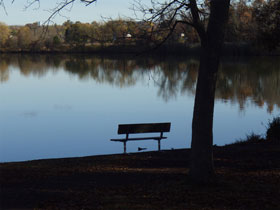 My most productive meditation moments come from my connection with the
sea. If you live by a body of water, whether it be the sea, a lake, river or
stream - water allows an every day meditative experience to escape from
your thoughts by experiencing the moment with nature. For me it’s important, it’s a way of life and it’s free. Nature allows one to live in the moment one breath at a time.
My most productive meditation moments come from my connection with the
sea. If you live by a body of water, whether it be the sea, a lake, river or
stream - water allows an every day meditative experience to escape from
your thoughts by experiencing the moment with nature. For me it’s important, it’s a way of life and it’s free. Nature allows one to live in the moment one breath at a time. 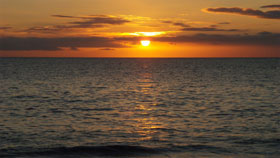 Mammals of the sea (such as whales, porpoise & dolphins) like our selves are air- breathing species; whether weighing 40 lbs or a 40 ton whale, in the sea you weigh nothing – free from gravity. In turn this gravity-free state influences a very relaxing, healthy, environment, from a slower heart rate, less food intake, to a very fragile existence which creates a time in which only the moment exists.
Mammals of the sea (such as whales, porpoise & dolphins) like our selves are air- breathing species; whether weighing 40 lbs or a 40 ton whale, in the sea you weigh nothing – free from gravity. In turn this gravity-free state influences a very relaxing, healthy, environment, from a slower heart rate, less food intake, to a very fragile existence which creates a time in which only the moment exists. 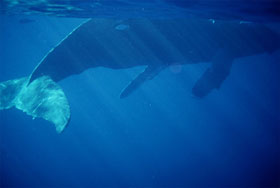 The only way to circulate so much oxygen is by living in a weightless
environment which influences deep breathing. It is estimated the
whale exchanges more than 2,500 gallons of air exchanging nearly
90% of its lung capacity with each breath. We ourselves exchange only about 1/3 of our capacity. Deep slow breathing creates calmness within, and simply said, “Relaxes our entire internal system -- body and mind”.
The only way to circulate so much oxygen is by living in a weightless
environment which influences deep breathing. It is estimated the
whale exchanges more than 2,500 gallons of air exchanging nearly
90% of its lung capacity with each breath. We ourselves exchange only about 1/3 of our capacity. Deep slow breathing creates calmness within, and simply said, “Relaxes our entire internal system -- body and mind”. 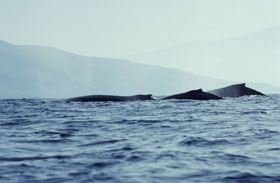 Another way is to use a mask and snorkel, lying face down, breathe and relax. I cannot explain this, but unlike my meditation practice at home in which my mind may wonder, it never wonders while lying weightless upon the sea. A weightless environment = breathing in a more relaxing manner.
Another way is to use a mask and snorkel, lying face down, breathe and relax. I cannot explain this, but unlike my meditation practice at home in which my mind may wonder, it never wonders while lying weightless upon the sea. A weightless environment = breathing in a more relaxing manner. 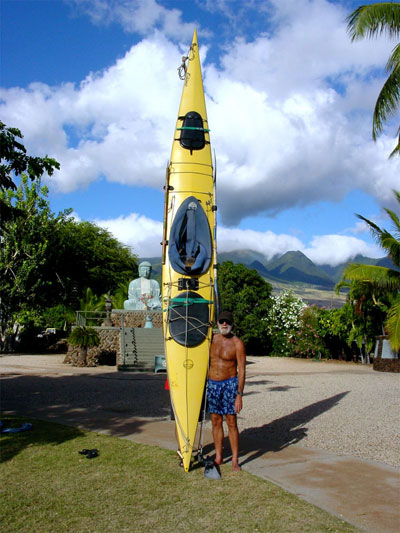 I recently read an article in National Wildlife Magazine 2023 entitled:
I recently read an article in National Wildlife Magazine 2023 entitled: 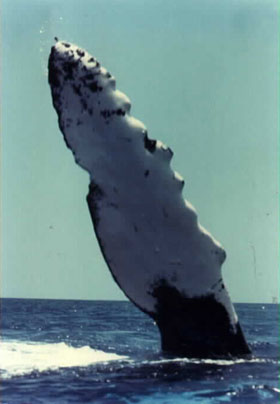 The following morning, not a cloud in sky as I lie in my kayak, hat down over my eyes taking a short catnap. The sun rises over the 10,000-foot summit of Haleakala Crater, when suddenly I feel something rub very gently on the bottom of my kayak, while at the same time a shadow covers the sun.
The following morning, not a cloud in sky as I lie in my kayak, hat down over my eyes taking a short catnap. The sun rises over the 10,000-foot summit of Haleakala Crater, when suddenly I feel something rub very gently on the bottom of my kayak, while at the same time a shadow covers the sun. 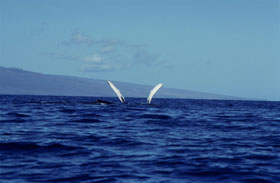
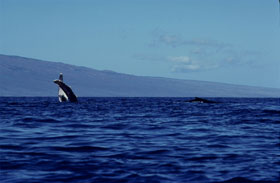
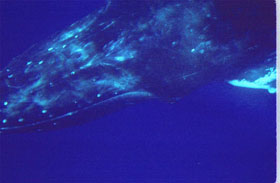 Another advantage of living in a weightless environment is that the whale consumes only 4 times its body weight annually; we ourselves take in more than 16 times our body weight annually. I believe this is also do to the effects that gravity has upon us.
Another advantage of living in a weightless environment is that the whale consumes only 4 times its body weight annually; we ourselves take in more than 16 times our body weight annually. I believe this is also do to the effects that gravity has upon us. 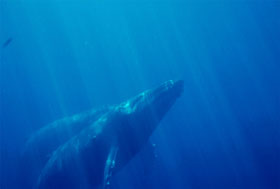 In my self-published book I include: “Earth and Sky, Woods and Fields, Lakes and Rivers, the Mountain and the Sea, are excellent schoolmasters, and teach some of us more than we can ever learn from books”.
In my self-published book I include: “Earth and Sky, Woods and Fields, Lakes and Rivers, the Mountain and the Sea, are excellent schoolmasters, and teach some of us more than we can ever learn from books”.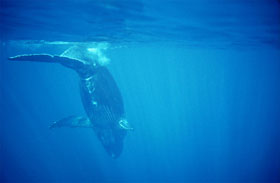 A very complex and advanced brain than we ourselves. – So complex I feel it allows them to live in a much higher conscience than we ourselves by simply living in the moment. Living in balance and harmony with its surroundings and all other natural life.
A very complex and advanced brain than we ourselves. – So complex I feel it allows them to live in a much higher conscience than we ourselves by simply living in the moment. Living in balance and harmony with its surroundings and all other natural life. 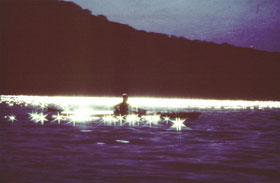 As guest speaker at the Hermanus Whale Festival in South Africa, I was introduced to a young man whom for decades is employed in one of the wildlife reserves. He brought to my attention an interesting fact of nature – living in the moment.
As guest speaker at the Hermanus Whale Festival in South Africa, I was introduced to a young man whom for decades is employed in one of the wildlife reserves. He brought to my attention an interesting fact of nature – living in the moment. 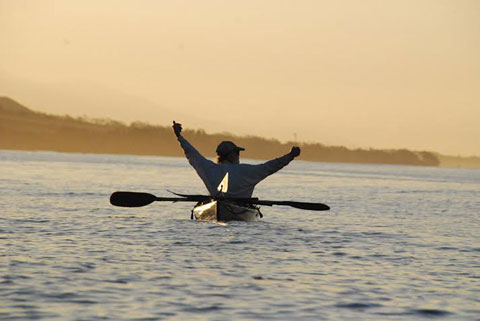
 This Site hosted by
This Site hosted by